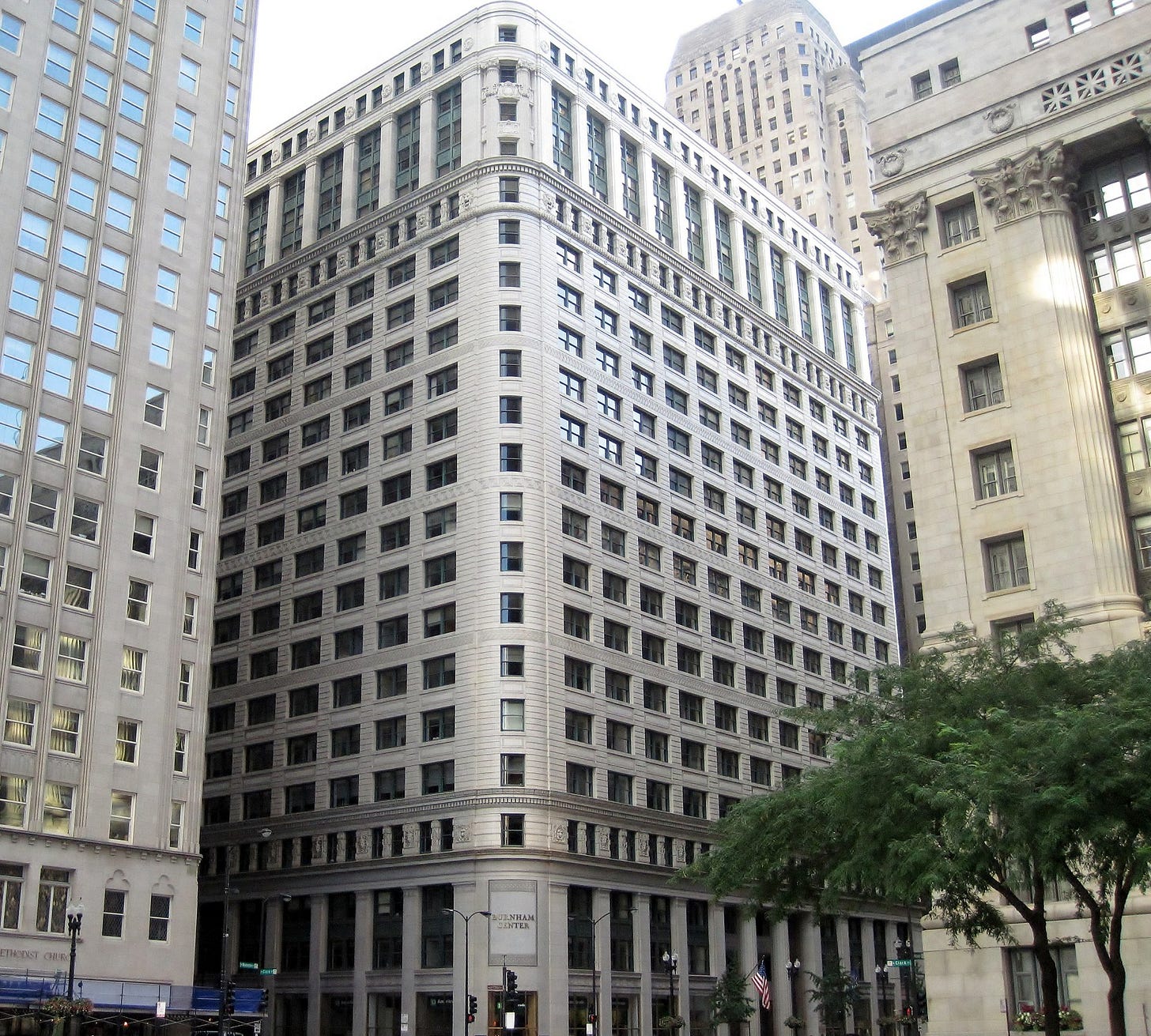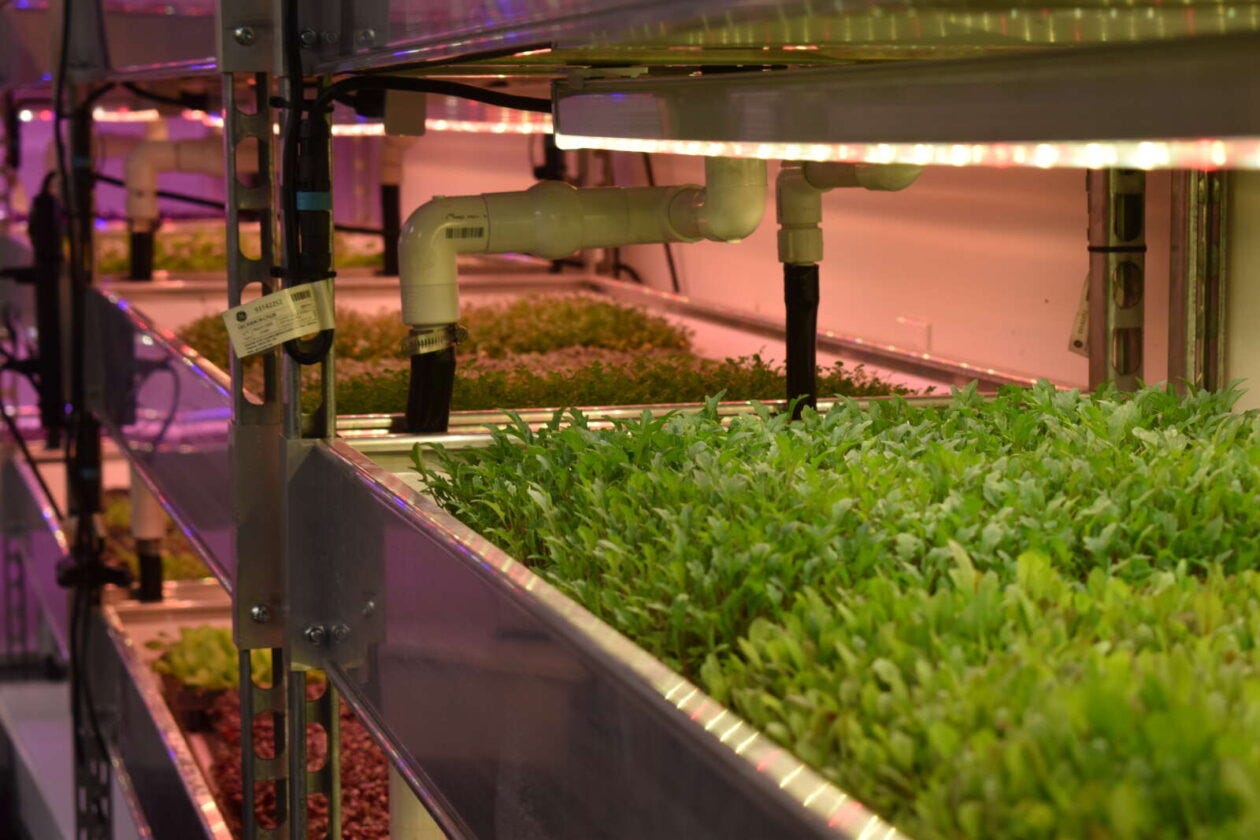These Office to Farm Conversions Could Revolutionize How We Live and Eat [Daily CRE SPECIAL REPORT Part 2 of 3]
The second part of a three part series on the potental of office to farm conversion as a solution to our current office crisis.
Editor’s Note: This is Part 2 of a 3-part series looking at how office-to-farm conversions could provide a way out for distressed office owners, investors, and others that are dealing with this most monumental of modern real estate conundrums. To read Part 1, click here. To jump to Part 3, click here.
Welcome back to Part 2 of our special report on office-to-farm conversions.
I’m going to cover several transformative projects already in motion, showcasing how urban spaces are being reimagined and repurposed to bring agriculture right to our doorsteps.
The cherry on top?
These conversions may be part of the solution to our current office real estate crisis, giving investors and office owners the opportunity to reimagine their portfolios and help build a greener future.
Project Name: Farm Zero Burnham
Property Type: Office
Farm Type: Vertical Farm
Location: Burnham Center, Chicago IL
First up is a potentially game-changing project emerging from the heart of Chicago. The Burnham Center, an architectural staple in the Windy City, is poised to become a beacon of modern farming within its historic walls.
Project Overview: Burnham Center
Nestled in downtown Chicago, the iconic Burnham Center is on the front lines of the office crisis. With substantial vacant space due to changing work patterns and economic shifts brought about by the pandemic, this skyscraper could soon be known not for bustling corporate activity but for rows upon rows of verdant crops reaching towards artificial skies.
Farm Zero, a nonprofit organization dedicated to sustainable agriculture practices, is in talks to lease as much as 70,000 square feet of empty office space and convert it into a vertical farm.
Why It's a Game Changer
The Burnham Center project isn't just about repurposing unused real estate; it's an embodiment of forward-thinking sustainability that addresses multiple issues simultaneously:
-Urban Food Production: By situating farms within city limits, we significantly shorten food supply chains. This proximity promises fresher produce delivered rapidly to consumers while cutting down on transportation emissions.
- Space Efficiency: Traditional farming requires vast tracts of land—an increasingly scarce resource especially near urban centers. Vertical farms like the one proposed for Burnham Center can yield up to 350 times more produce per acre than conventional farms by utilizing vertical space.
- Water Conservation: Indoor farming technologies such as hydroponics used in vertical farms can lead to staggering reductions in water usage—up to 95% less than field farming—a critical advantage given growing concerns over water scarcity.
- Year-Round Harvests: Weather patterns don't impede indoor farms. They're insulated from droughts, frosts, and storms that can devastate traditional crops—this means consistent production and stable food supplies year-round.
- Reduced Pesticide Use: Controlled environments negate many pest problems encountered in open-air agriculture; thus reducing or eliminating the need for harmful chemicals.
Why This Project Matters for CRE Investors and Stakeholders
For CRE investors and stakeholders, the Burnham Center’s office-to-farm conversion in Chicago isn't just an interesting experiment—it's a potential harbinger of a new asset class within urban cores. This project showcases how adaptive reuse can transform underperforming properties into valuable, sustainable ventures, providing a creative solution to the glut of empty office space plaguing markets across the nation.
It demonstrates that with innovation and vision, real estate can pivot from traditional models and generate fresh streams of income by meeting evolving demands—like those for local, sustainable food sources. As such, it's a compelling case study for investors looking to future-proof their portfolios against shifts in workplace dynamics while contributing positively to urban ecosystems.
Project Name: Area 2 Farms Arlington
Property Type: Industrial
Farm Type: Vertical Farm
Location: Arlington, VA
In Arlington, Virginia, a remarkable transformation is taking place. A nondescript warehouse has been transformed into Area 2 Farms. Co-founders Jackie Potter and Tyler Baras have ingeniously repurposed this space, marrying technology with nature in an unexpected symphony of sustainability.
Why It's a Game Changer
The emergence of Area 2 Farms as an epicenter for urban farming innovation cannot be understated. By breathing new life into previously underutilized commercial spaces, this project represents more than just food production; it's the embodiment of resilience and adaptability in an ever-changing urban landscape.
The ability to harvest radishes alongside wasabi arugula in an environment where paper files once languished in storage speaks volumes about our capacity to reimagine and repurpose our built environment.
With its roots firmly planted in soil-based practices, Area 2 Farms not only provides year-round bounty but also strengthens connections within the community—inviting residents to engage directly with the source of their sustenance through farm tours and CSA programs.
Why This Project Matters for CRE Investors and Stakeholders
For investors, Area 2 Farms offers a compelling glimpse into what could very well be the future of property development. The success seen here is not just about converting vacant square footage into verdant farmland—it's about recognizing the potential for CRE assets to evolve alongside societal needs.
In Arlington, this space might have sat unused or even been demolished. It has found new life and renewed purpose through this project.
Investors may benefit from revenue diversification through similar projects. By converting underutilized properties into vertical farms, CRE investors can tap into new revenue streams. The demand for locally sourced, fresh produce is on the rise, providing a market opportunity that aligns with consumer trends.
Innovative reuse can also increase the attractiveness and value of properties that might otherwise be difficult to lease. Urban farms can serve as anchor tenants that draw additional interest from complementary businesses and consumers alike.
There are also significant potential risk mitigation opportunities. Diversifying property use can mitigate risks associated with economic downturns or changes in office space demand. Vertical farming provides stability through long-term leases and resilience against market fluctuations affecting traditional office tenants.
Project Name: Calgary Tower Centre (Agriplay Ventures)
Property Type: Office
Farm Type: Indoor Farm
Location: Calgary, Alberta (Canada)
Agriplay Ventures Inc. is working to change one of Calgary's iconic office spaces into a burgeoning hub of agricultural productivity. The Calgary Tower Centre, a symbol of the city's architectural heritage, is set to become home to one of Canada's largest indoor urban farms.
Addressing both the high vacancy rates in downtown Calgary and the growing need for local food production, Agriplay's initiative is converting 65,000 square feet of unused office space into one of Canada’s largest elevated urban farms. The firm aims to work within the existing constraints of commercial properties, as well as focus on ensuring energy efficiency, and enhancing asset value without compromising structural or financial integrity.
Why It's a Game Changer
Agriplay's initiative represents a game-changer in multiple arenas: it addresses high vacancy rates in urban commercial real estate by repurposing idle office space; it significantly contributes to local food security and sustainability goals; and it showcases how technology can bridge the gap between traditional agriculture and modern infrastructural constraints.
The innovative use of proprietary aeroponic-like systems allows for high-yield crop production without the need for sunlight or soil, revolutionizing the concept of farming within an urban setting. Moreover, by utilizing up to 90% less energy compared to conventional vertical farms, Agriplay sets new standards in energy efficiency, making it a leading example of environmentally responsible innovation in the agricultural sector.
Why This Project Matters for CRE Investors and Stakeholders
For commercial real estate (CRE) investors and stakeholders, Agriplay's conversion process could potentially improve property value by introducing advanced smart-building infrastructure while at the same time, ensuring that spaces can be reverted back to their original state if required—hopefully minimizing investment risks associated with permanent alterations.
With potential operating profit margins around 22%, according to Agriplay's projections, investors have the opportunity to tap into a lucrative market while contributing positively to community resilience and sustainability initiatives.
That’s it for today. Tune in tomorrow for our final piece on office-to-farm conversions where we’ll highlight the economics behind these conversions and what we might expect to see beyond the projects covered in today’s newsletter.
Subscribe below for Part 2 of this special report on Office-to-Farm conversions. Hit the subscribe button for immediate access.
These Office to Farm Conversions Could Revolutionize How We Live and Eat [Daily CRE SPECIAL REPORT Part 1 of 3]
Thanks for reading Unreal Assets Daily CRE Update! Subscribe for free to receive new posts and support my work. Editor’s Note: This is Part 1 of a 3-part series looking at how office-to-farm conversions could provide a way out for distressed office owners, investors, and others that are dealing with this most monumental of modern real estate conundrums.
These Office to Farm Conversions Could Revolutionize How We Live and Eat [Daily CRE SPECIAL REPORT Part 3 of 3]
Thanks for reading Unreal Assets Daily CRE Update! Subscribe for free to receive new posts and support my work. Editor’s Note: This is Part 3 of a 3-part series looking at how office-to-farm conversions could provide a way out for distressed office owners, investors, and others that are dealing with this most monumental of modern real estate conundrums.






![These Office to Farm Conversions Could Revolutionize How We Live and Eat [Daily CRE SPECIAL REPORT Part 1 of 3]](https://substackcdn.com/image/fetch/$s_!8Sj8!,w_1300,h_650,c_fill,f_auto,q_auto:good,fl_progressive:steep,g_auto/https%3A%2F%2Fsubstack-post-media.s3.amazonaws.com%2Fpublic%2Fimages%2F6dfdb5eb-7e53-44fc-ac5d-fc565234dfec_700x394.jpeg)
![These Office to Farm Conversions Could Revolutionize How We Live and Eat [Daily CRE SPECIAL REPORT Part 3 of 3]](https://substackcdn.com/image/fetch/$s_!fHCc!,w_1300,h_650,c_fill,f_auto,q_auto:good,fl_progressive:steep,g_auto/https%3A%2F%2Fsubstack-post-media.s3.amazonaws.com%2Fpublic%2Fimages%2F9c3714b1-9ece-451d-824a-14b0e5827edd_1500x900.jpeg)